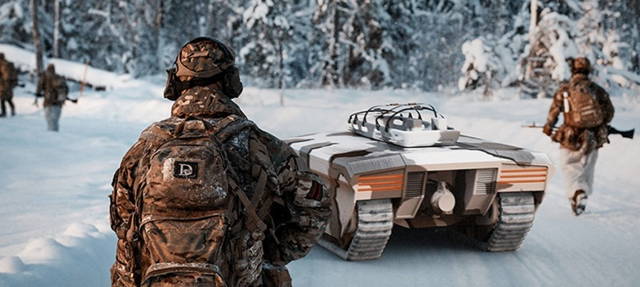Rheinmetall and BAE Systems' joint venture, Rheinmetall BAE Systems Land (RBSL), founded in 2019, heads a consortium of British companies engaged in the research of concepts of new, economical and high-performance uninhabited ground robotic systems (Unmanned Ground Vehicles, UGV) for the British Army. The project is an order of the Defense Science and Technology Laboratory (Defense, Science and Technology Laboratory, Dstl) of the Ministry of Defense of the United Kingdom. This is part of a larger study called "Platform-based Combat Systems" (MCS).
The aim of the study is to develop a "more reliable, flexible and efficient" platform that also has a high speed of operation. It is believed that the pace of operations should outpace the decision-making process of the enemy. In addition, the system must have amphibious properties. Another goal of the study is to study how, in a mobile warfare scenario, ground-based robotic systems can be integrated with other manned platforms in order to get an idea of the possible future deployment of British ground forces. According to RBSL, together with Dstl, the consortium is working on a concept and risk analysis for this technology. The consortium includes the following companies: Prodrive, ARKE, Think! Creative, Cranfield University and BAE Systems.
According to the RBSL press release, the project is divided into two phases. At the first stage, it is planned to study the technologies currently available, and at the second stage, technologies that are likely to mature only within the next ten years. It is reported that the consortium will focus on platforms in the weight category from 2 to 5 tons, since this range will provide the possibility of using platforms for a variety of tasks. Such tasks, among other things, include the transportation of materiel and wounded, reconnaissance or the use of the platform as a weapon carrier. At the same time, it is necessary for a person to make a decision to defeat goals (the principle of "man in a cycle").
Both the head of the RBSL Mobility Department, Dr. Marcus Potter, and the responsible project manager at Dstl, Matt Ackroyd, see great prospects in the project for further operational development of ground-based robotic complexes. RBSL also informs that an evaluation phase is planned as the next step. In the course of its implementation, the developed concepts are planned to be compared with currently available military robots. At the next stage, the operational capabilities of the concepts will be tested under controlled conditions.
According to the materials of the resource soldat-und-technik.de

